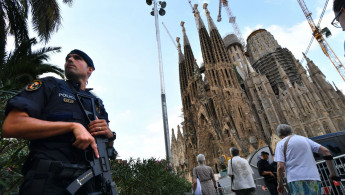Spain identifies Barcelona main attack suspect as Europe manhunt widens
Fifteen people were killed and more than 100 injured last week when a white van sped into the historic Ramblas promenade, knocking people down in a scene of chaos and horror.
The death toll had risen to 15 on Monday as officials said a man found stabbed to death in a car outside Barcelona - identified as Pau Perez - was linked to the case.
The regional interior minister of Catalonia Joaquim Forn said in a radio interview that "everything suggests the van driver is Younes Abouyaaqoub".
Police believe Abouyaaqoub stabbed Perez to steal his car and escape the city.
The 22-year-old Moroccan is believed to be the last remaining member of a 12-man cell still at large in Spain or abroad.
The rest have been killed by police or detained over last week's twin attacks in Barcelona and the seaside resort of Cambrils.
Spanish authorities said they were officially notifying European police on Monday of the identity of the suspect to enable the launch of a Europe-wide manhunt.
"We have to talk to European police to notify them of the identity because this person... is likely being sought in all European countries," Forn said.
Investigators seeking to unravel the cell of attackers have focused their attention on the small border town of Ripoll at the foot of the Pyrenees Mountains.
Several of the suspected attackers including Abouyaaquob grew up or lived in the town.
Missing imam
A Moroccan imam aged in his 40s, Abdelbaki Es Satty, has also come under scrutiny as he is believed to have radicalised youths in Ripoll. The imam has been missing since Tuesday.
Police said Satty spent time in prison and had once been in contact with a suspect wanted on terrorism charges.
In the Moroccan town of M'rirt, relatives of Abouyaaqoub also accused the imam of radicalising the young man as well as his brother Houssein.
"Over the last two years, Younes and Houssein began to radicalise under the influence of this imam," their grandfather told AFP.
A neighbour close to the Abouyaaquob family, speaking on condition of anonymity, said the imam "had recruited Moroccans of Ripoll and planned the attacks".
But Ali Assid, president of the Annour Islamic community that runs the mosque in Ripoll where Satty was preaching, said the imam "behaved like a normal person here".
"He never sent a radical message, all he preached was really Islam. If he is behind all that, there he must be showing us one face in the mosque and showing another face outside," Assid told SER radio.
Assid said Satty had parted ways with the mosque in late June after Ramadan, as he wanted a vacation of three months - a request that the group did not agree to.
On Saturday, police raided his apartment. They have raised the possibility that he died in an explosion on Wednesday evening at a house believed to be the suspects' bomb factory, where police uncovered a massive cache of 120 gas canisters.
'More attacks'
The suspected attackers had been preparing bombs for "one or more attacks in Barcelona", regional police chief Josep Lluis Trapero told reporters, revealing that traces of triacetone triperoxide (TATP) - a homemade explosive that is a hallmark of the Islamic State group - had also been found.
The suspects accidentally caused an explosion at the house on the eve of Thursday's attack in Barcelona - an error that likely forced them to modify their plans.
Instead, they used a van to smash into crowds on Barcelona's Las Ramblas Boulevard.
Several hours later, a similar attack in the seaside town of Cambrils left one woman dead. Police shot and killed the five attackers in Cambrils, some of whom were wearing fake explosive belts and carrying knives.
IS claimed responsibility for the attacks, believed to be its first in Spain.
In the small town of Alcanar, investigators combed the rubble of the house believed to be the bomb factory, where the gas canisters were uncovered.
A neighbour, 61-year-old French retiree Martine Groby, told AFP that four men "who all speak French" had been in the house next door since April.
"They were very discreet, too discreet. The shutters were closed, there was no music, no children, no women," she recalled.





 Follow the Middle East's top stories in English at The New Arab on Google News
Follow the Middle East's top stories in English at The New Arab on Google News


